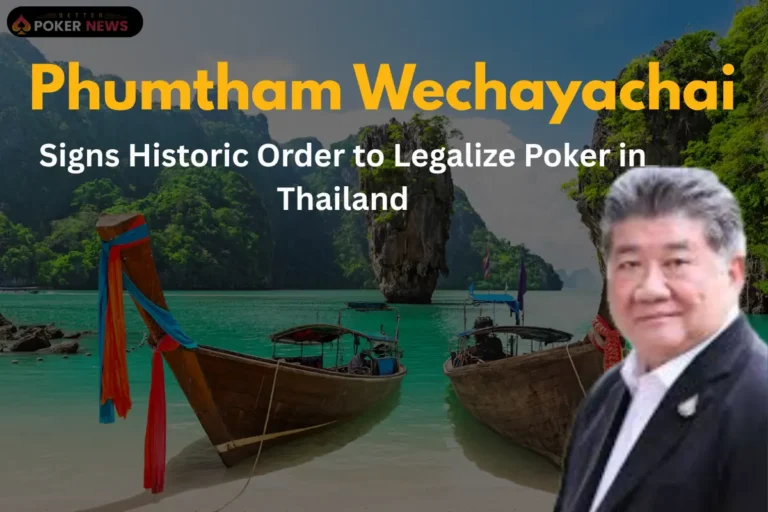In a historic move, Thailand’s Interior Minister Phumtham Wechayachai has signed an order to revoke outdated regulations, paving the way for the legalisation of poker in the country. This landmark decision seeks to establish poker as a legitimate sport, opening the door for Thailand to host international tournaments. While the move has been hailed as a step forward, the legalisation process is far from complete, with important legal frameworks and regulations still under review.
South China Morning Post
Also Read: North Las Vegas Loses Its Last Poker Room as Poker Palace Closes in October
A Step Toward Legitimacy
As the Acting Prime Minister, Phumtham emphasised that the legalisation of poker is a delicate issue that requires thorough examination. He acknowledged the growing global recognition of poker as a competitive sport but stressed the necessity of a careful, controlled approach. “While poker is increasingly recognised as a sport internationally, any move to legalise it must be backed by proper legal processes and safeguards,” Phumtham explained.
Although the ban on poker has been officially lifted, the regulations surrounding its legalisation remain provisional. The Interior Ministry’s order revokes the directive dated July 28, 1958, which had imposed severe restrictions on poker games. These outdated regulations were deemed inconsistent with the current global context and were no longer fit for purpose.
Legal Challenges Ahead
While the decision to lift the poker ban is significant, there are still several legal hurdles to clear before poker can be fully legalised. One of the main points of contention is whether poker can be classified as a sport. If it is recognised as such, it will require strict oversight and regulation. Phumtham has made it clear that while poker will be allowed to thrive competitively, the legalisation process will only proceed once the necessary regulatory frameworks are in place.
Thai Newsroom
The Acting Prime Minister also addressed concerns about gambling addiction, a common issue associated with the legalisation of gambling activities. He assured the public that, while poker is a competitive sport, it will be subject to specific conditions to ensure its proper regulation and to mitigate potential risks. “What is appropriate should be allowed, and what isn’t must be clearly prohibited,” he said.
The Road Ahead
The legalisation of poker in Thailand is still a work in progress. According to Phumtham, a committee will be established to oversee the necessary legal amendments and to ensure that the regulation is properly enforced. The committee will work on crafting a regulatory framework that balances the promotion of poker as a sport with the need to control other gambling activities, ensuring that poker’s legalisation does not lead to an increase in illegal gambling or addiction problems.
Thailand’s approach to poker’s legalisation could serve as a model for other countries looking to regulate poker in a manner that both supports the sport’s growth and addresses public concerns.
Also Read: Bangkok Blinds Up: WPT Prime Ignites Thai Poker Scene
Looking Toward International Poker Tournaments
For poker enthusiasts and industry professionals, the potential for Thailand to become a host for international poker tournaments is a thrilling prospect. The country’s decision to recognise poker as a legitimate sport will likely attract major international events, providing a boost to the local economy and putting Thailand on the global poker map.
As the legal process continues, all eyes will be on Thailand to see how it navigates the complex intersection of sports, entertainment, and gambling regulation.
Source: Nationthailand.com

